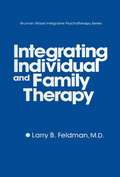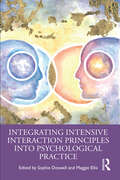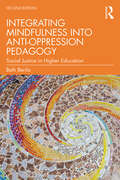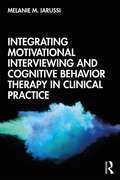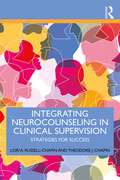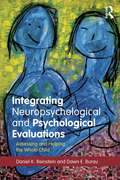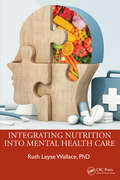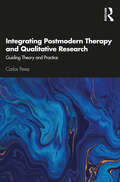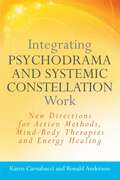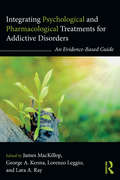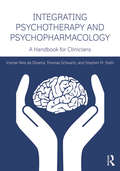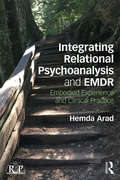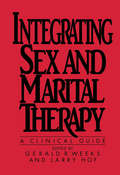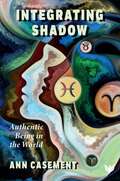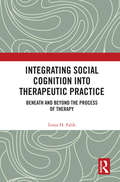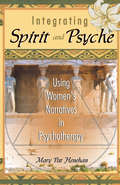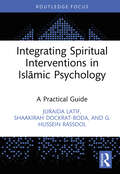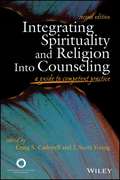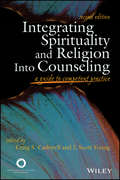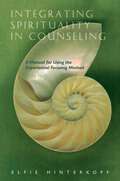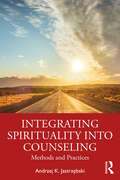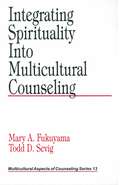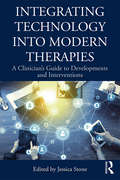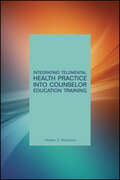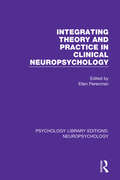- Table View
- List View
Integrating Individual And Family Therapy
by Larry B. FeldmanFirst published in 1992. Routledge is an imprint of Taylor & Francis, an informa company.
Integrating Intensive Interaction Principles into Psychological Practice
by Sophie DoswellThis book details how to use Intensive Interaction as a psychologically informed practice when working with ‘seldom-heard’ clients.Although Intensive Interaction was originally developed for children with severe and profound learning disability, its use has expanded across age ranges and conditions, and is now utilised with children and adults including autistic individuals and people with dementia. Exploring the context in which Intensive Interaction has and can be used, specifically as a psychological approach, this edited volume covers therapeutic intervention on a one-to-one basis, as well as an intervention within other frameworks such as Trauma Informed Care and Positive Behaviour Support. Case examples are utilised throughout, alongside psychological theory, to demonstrate use in practice. Consideration is also paid to service contexts and how psychologists can introduce this approach in their local areas.The first book on Intensive Interaction written by psychologists for psychological practitioners, this book will appeal to trainee and qualified clinical and counselling psychologists, and psychological practitioners including creative therapists and counsellors.
Integrating Mindfulness into Anti-Oppression Pedagogy: Social Justice in Higher Education
by Beth BerilaDrawing from mindfulness education and social justice teaching, this book explores an effective Anti-Oppression pedagogy for university and college classrooms. Authentic classroom discussions about oppression and diversity can be difficult; a mindful approach allows students to explore their experiences with compassion and to engage in critical inquiry to confront their deeply held beliefs and value systems. This engaging book is full of practical tips for deepening learning, addressing challenging situations, and providing mindfulness practices in anti-oppression classrooms. In this fully revised edition, Dr. Berila positions discussion in the current context and expands exploration of power and implicit bias, transformative learning, and trauma. Integrating Mindfulness into Anti-Oppression Pedagogy is for all higher education professionals interested in and teaching Social Justice pedagogy that empowers and engages students in the complex unlearning of oppression.
Integrating Motivational Interviewing and Cognitive Behavior Therapy in Clinical Practice
by Melanie M. IarussiIntegrating Motivational Interviewing and Cognitive Behavior Therapy in Clinical Practice shows counseling and other mental health professionals how the theoretical bases and evidence-based practices of motivational interviewing (MI) and cognitive behavior therapy (CBT) can be used together to maximize client outcomes. Chapters outline effective methods for integrating MI and CBT and show how these can be applied to clients in a diverse range of mental health, substance use and addiction, and correctional settings. Written in a clear and applicable style, the text features case studies, resources for skill development, and "Voices From the Field" sections, as well as chapters devoted to specific topics such as depression, anxiety, and more. Building on foundational frameworks for integrative practice, this is a valuable resource for counseling and psychotherapy practitioners looking to incorporate MI and CBT into their clinical practices.
Integrating Neurocounseling in Clinical Supervision: Strategies for Success
by Lori A. Russell-Chapin Theodore J. ChapinIntegrating Neurocounseling in Clinical Supervision provides an indispensable framework for understanding supervision using neuroscience. Chapters explore a range of topics, from basic neuroanatomy to the complexities of the default mode network. Beginning with overviews of supervision and of common challenges and ethical concerns, the book presents five supervision models, allowing the supervisor to select the best fit for each supervisee and each question. By combining supervision theory, practical applications, discussion questions, and case studies and demonstrations, the authors prepare counselors to be more intentional about brain functions to increase the efficacy of supervision. New video demonstrations available on the companion website emphasize client outcomes for each of the five supervision models and one group counseling scenario, connecting directly to chapter content and demonstrating the major elements of each model.
Integrating Neuropsychological and Psychological Evaluations: Assessing and Helping the Whole Child
by Dawn E. Burau Daniel K. ReinsteinIntegrating Neuropsychological and Psychological Assessments is a resource for neuropsychologists, psychologists, teachers and parents who wish to address both the neurologically- and emotionally-based difficulties with which their children are presenting. In addition to a thorough description of neuropsychological and psychological assessment tools, this book also provides professionals with a unified approach to using the results from assessments to understand and integrate cognitive, behavioral, social and emotional functioning in school-age children. It posits that to educate and treat children who are struggling in school due to unique cognitive or emotional vulnerabilities, the whole child must be considered to decipher their needs and implement interventions. Cultivating a therapeutic relationship that integrates the emotional and relational functioning of the child enhances both their learning and ability to successfully navigate the world.
Integrating Nutrition Into Mental Health Care
by Ruth Leyse WallaceMental health counselors, psychologists, social workers, and psychiatrists realize that nutrition may be a factor in their clients’ mental health, but a lack of nutritional science background and resources makes it difficult for them to incorporate nutrition into the care they provide. Likewise, registered dietitian nutritionists, new to the field of mental health care (whether in a facility or in private practice), may feel the need for succinct resources geared to this area of nutritional care. Integrating Nutrition into Mental Health Care illuminates the intersection between nutrition and mental health, bridging the gap for professionals in both fields.It presents resources in areas such as caffeine intake, family history of a genetically transmitted nutrition-related condition, interpretation of laboratory nutritional assessment, and safe upper limits of supplements, as well as additional nutrition factors, helping practitioners easily incorporate selected nutritional aspects into the mental health care of clients. The book includes sample forms for office use and instructions to interpret client information. They can be easily downloaded and printed from the Routledge book page. Additional forms available help in facilitating referral to a registered dietician nutrtionist (RDN) for a deeper look at individual patient’s nutritional issues.To offer further information on nutrition and metal health, the text features a series of short fictional, but real-life, nutrition stories. These stories provide an enjoyable format in which to train, or test, the reader’s knowledge.
Integrating Postmodern Therapy and Qualitative Research: Guiding Theory and Practice
by Carlos PerezThis book interrogates postmodern theories of therapeutic research and practice to demonstrate how these approaches can be effectively integrated into methods of data collection and analysis. Drawing from theories of counseling, and marriage and family therapy, the book thoroughly explores the similarities between therapy and qualitative research. Chapters consider therapies which offer a humanistic "way of being," such as collaborative language systems, narrative therapy, and solution-focused brief therapy, and identify complementary philosophies and traits that can be used to guide the qualitative researcher’s practice. Transcripts and vignettes of the author’s practice as both a therapist and a researcher further help to illuminate how readers might enrich their processes of research and data analysis. Suitable for use on graduate-level qualitative research courses, as well as an adjunct to marriage and family therapy courses, Integrating Postmodern Therapy and Qualitative Research innovatively encourages readers to reflect on and develop their personal practice and approach to analyzing key information.
Integrating Psychodrama and Systemic Constellation Work
by Ronald Anderson Karen CarnabucciSystemic Constellation Work is a rapidly growing experiential healing process that is being embraced by a variety of helping professionals, both traditional and alternative, worldwide. This book explores the history, principles and methodology of this approach, and offers a detailed comparison with psychodrama - the original mind-body therapy - explaining how each method can enhance the other. Constellation work is based on the notion that people are connected by unseen energetic forces and suggests that the psychological, traumatic and survival experiences of our ancestors are genetically passed forward to the next generation and may live within us. Using insightful case studies from a variety of client groups, this book shows how Systemic Constellation Work can expand the possibilities of psychodrama techniques, and can be successfully integrated with psychodramatic enactment, guided imagery, ritual, concretization and other methods of healing and personal growth. This book will be essential reading for students and practitioners of psychodrama and Constellation work, as well as counselors, mental health professionals, experiential therapists, creative and expressive arts therapists and alternative practitioners looking to widen their knowledge of mind-body therapies.
Integrating Psychological and Pharmacological Treatments for Addictive Disorders: An Evidence-Based Guide (Clinical Topics in Psychology and Psychiatry)
by James MacKillop George A. Kenna Lorenzo Leggio Lara A. RayIntegrating Psychological and Pharmacological Treatments for Addictive Disorders distills the complex literature on addiction, offering a curated toolbox of integrated pharmacological and psychotherapeutic treatments in chapters authored by leading experts. Introductory chapters on the epidemiology, etiology, and fundamentals of addiction treatment provide a concise overview of the state of the field. Subsequent chapters then focus on the treatment of specific substance use disorders and on gambling disorder. Finally, a chapter on the treatment of addiction in primary care addresses the opportunities for clinical care in non-specialist outpatient settings. Physicians, psychologists, social workers, and other mental health professionals will come away from the book with an essential understanding of evidence-based practice in treating addiction and the scientific foundations of those approaches. .
Integrating Psychotherapy and Psychopharmacology: A Handbook for Clinicians (Clinical Topics in Psychology and Psychiatry)
by Stephen M. Stahl Thomas Schwartz Irismar Reis de OliveiraIntegrating Psychotherapy and Psychopharmacology: A Handbook for Clinicians is a practical guide for the growing number of mental-health practitioners searching for information on treatments that combine psychopharmacology, psychotherapy, and psychosocial rehabilitation. Research shows that combined approaches are among the most effective ways to treat an increasing number of psychiatric disorders. However, though these combined treatments are becoming the everyday practice of psychiatrists, psychologists, and other mental-health professionals, identifying the right treatment plan can be notoriously difficult, and clinicians are often left scrambling to answer questions about how to design and customize their treatment strategies. In Integrating Psychotherapy and Psychopharmacology, readers will find these questions fully addressed and the answers explained, and they’ll come away from the book with a toolbox full of strategies for helping their patients improve symptoms, achieve remission, and stay well using a combination of drug and psychological treatments.
Integrating Relational Psychoanalysis and EMDR: Embodied Experience and Clinical Practice (Relational Perspectives Book Series)
by Hemda AradIntegrating Relational Psychoanalysis and EMDR: Embodied Experience and Clinical Practice provides contemporary theoretical and clinical links between Relational Psychoanalysis, attachment theory, neuroscience, and Eye Movement Desensitization and Reprocessing, all of which bring both the patient’s and analyst’s embodied experience into the forefront of clinical thinking and practice. The author grounds an in-depth view on the ways psychoanalysis and EMDR can be effectively integrated to complement each other through a presentation of fundamental concepts and an abundance of insightful and moving clinical vignettes. Hemda Arad outlines the theoretical and clinical concepts that allow the integration of Relational Psychoanalysis with EMDR’s unique contributions, specifically appreciating the neurological and embodied experience in an individual’s development in relation to the classic talking cure’s approach to dealing with "big T" trauma and with "small t" everyday attachment-related trauma. Arad describes a view of a modified EMDR approach capable of reaching many patients, beyond the trauma work for which it originally became known, in order to lend its more embodied approach to the advancement of the relational endeavor. Vivid clinical illustrations, chosen to elucidate theoretical concepts, make the complex theoretical ideas more accessible. The clinical portions illustrate a range of ways that EMDR and relational work, which may at first seem incompatible, may be integrated to help therapists navigate the two methods. Integrating Relational Psychoanalysis and EMDR: Embodied Experience and Clinical Practice will appeal to psychoanalysts, psychoanalytic psychotherapists and psychodynamic therapists who wish to learn about the relational tradition in theory and practice or are seeking a way to integrate their work with other versatile approaches such as EMDR, as well as advanced students studying across these areas and EMDR clinicians who would like to broaden the scope of their skills.
Integrating Sex And Marital Therapy: A Clinical Guide
by Gerald R. WeeksThe field of sex therapy has experienced tremendous growth in the last 20 years . The use of the term "sex therapy" for most clinicians brings several well-known therapists to mind and is associated with the treatment of a fairly limited number of sexual problems. The view of sex therapy as a profession has had both positive and negative consequences. The editor’s state that the purpose in writing and editing this book was to build on the work of individually oriented sex therapy by adding the systems perspective. This book, then, represents an attempt at the integration of sex and marital or systems therapy.
Integrating Shadow: Authentic Being in the World
by Ann CasementSince its inception, the notion of shadow is recognised as one of Jung's major contributions to the world of psychology. Shadow traits are often unconsciously felt to be threats to our self-image, so we use defence mechanisms, such as repression and denial, to dismiss its existence and place it on to others, either in the personal or collective sphere. Although there exists considerable overlap between the strands, dividing the shadow into three constituent parts, personal, collective, and archetypal, helps to fully explore its impact on the world. The personal shadow is usually viewed as the base, inferior part of personality, although it can also include positive aspects, but it needs to be acknowledged and incorporated to make an individual whole. The collective shadow is found in many dark periods of history: witch hunt trials, religious wars, the Holocaust, and Rwandan genocide to name but a few; in today's world, it is spread at the speed of light by mass media. The archetypal shadow emanates from the realm of the collective unconscious and may be equated with evil. Alongside shadow is the inextricably linked concept of persona, the outer face that is presented to the world, which is also explored in detail, as well as the role of the shadow in the act of scapegoating and within the professional sphere, and Jung's links to the social sciences, in particular anthropology and sociology. Shadow is a theme that Ann Casement returned to many times in her decades-long career, always finding new ways to explore and explain it. Integrating Shadow: Authentic Being in the World brings together these many years of presentations and research to present a multi-layered and rich discourse on the meaning, importance, and consequences of the shadow in all our lives.
Integrating Social Cognition into Therapeutic Practice: Beneath and Beyond the Process of Therapy
by Louis H. FalikThis book presents a new model for conceptualizing and applying a social and cognitive perspective on therapeutic practice. Building on the micro-skills framework for training, the author adds cognitive modifiability theories to create a social cognition approach to training and practice. The material has been field tested in a graduate academic context and in consultation in mental health settings, and chapters contain didactic explications, illustrative examples, practice exercises, and graphic schemas to help readers integrate specific practices into a broader comprehensive theoretical framework. Mental health professionals and students in advanced counseling courses will find that this book broadens their perspectives beyond basic micro-skills approaches and provides an expansive and systematic framework for conceptualizing the therapeutic process.
Integrating Spirit and Psyche: Using Women's Narratives in Psychotherapy
by Harold G Koenig Mary Pat HenehanIn this extraordinary collection, the voices of women's experience ring out loud and true! The power of narrative in therapy for women is undeniable. Used well, other women's narratives can help us to understand and rewrite our own. Here, women bare their souls, reflecting on self-enhancement and growth, on discrediting negative family scripts, on seeing through demeaning cultural messages, on living in the modern world, on their wildness, wisdom, spirituality, and a great deal more! Each chapter includes questions for reflection to help readers incorporate these narratives into their own lives. From the author: “This book began with the women's groups I facilitate. Some themes arose many times: I feel bad about myself; I can't speak up at times; I don't feel like I have any rights; I feel stupid; I feel like I am bad. But as therapy progressed, new narratives were expressed: I do have a voice; I am knowledgeable; I like being who I am; and I can work through this conflict. “As a writer and therapist, I have taken a stance about ideas that are presented in sessions with clients and that exist in their culture. This book elaborates on those ideas and offers readers an opportunity to think about them in their own lives. Women can rewrite their lives as they become aware of their stories.” Some of the narratives that you'll find in Integrating Spirit and Psyche: Using Women's Narratives in Psychotherapy explore: women as second-class citizens putting the self in context women's spirituality in its many forms anger as it relates to gender societal pressure on women to bear terrible burdens in silence ways that various cultures have demeaned women-infanticide, foot binding, genital mutilation, dowry deaths, etc. societal messages that encourage feelings of helplessness, shame, anger, and inhibition in women ways to resolve conflicts, take credit where it’s due, and express ourselves mind-body connections women to look to for inspiration--Virginia Woolf, Marie Curie, Jackie Joyner-Kersee, Margaret Thatcher, and many more aging and wisdom women's spiritual practices--meditation, T'ai Chi, Chakra Awareness, practices from the Judeo-Christian traditions, and more!
Integrating Spiritual Interventions in Islamic Psychology: A Practical Guide (Islamic Psychology and Psychotherapy)
by G. Hussein Rassool Juraida Latif Shaakirah DockratThis book provides Islāmic psychology practitioners a framework on integrating evidence-based approaches of spiritual interventions based on Islāmic jurisprudence (Shari’ah with therapy). Covering both the theoretical and theological underpinnings of religious coping from an Islāmic perspective while also serving as a practical guide, this text delivers an integrative approach which can be used in psychotherapy to ensure a more holistic process of healing and well-being. It outlines the positive and essential contributions that interventions rooted in Qur’ânic and Sunnah evidence can make in terms of prevention, treatment, and recovery, describing a wide variety of practices and beliefs. Chapters focus on highlighting the importance of daily supplications and prayers, as well as other Prophetic remedies as part of a comprehensive, encompassing therapeutic plan for not only psycho-spiritual, but also physiological afflictions. This book provides all Muslim mental health practitioners, trainees, and students as well as healthcare workers in Muslim communities with an accessible guide to using Islāmic spiritual interventions in therapeutic practice.
Integrating Spirituality and Religion Into Counseling: A Guide to Competent Practice
by Craig S. Cashwell J. Scott YoungIn this book, experts in the field consider how spiritual and religious issues can be successfully incorporated into counseling in a manner consistent with client beliefs and practices. Designed as an introductory text for counselors-in-training and clinicians, it describes the knowledge base and skills necessary to effectively engage clients in an exploration of their spiritual and religious lives to further the therapeutic process.
Integrating Spirituality and Religion Into Counseling: A Guide to Competent Practice
by Craig S. Cashwell J. Scott YoungIn this book, experts in the field discuss how spiritual and religious issues can be successfully integrated into counseling in a manner that is respectful of client beliefs and practices. Designed as an introductory text for counselors-in-training and clinicians, it describes the knowledge base and skills necessary to effectively engage clients in an exploration of their spiritual and religious lives to further the therapeutic process. Through an examination of the 2009 ASERVIC Competencies for Addressing Spiritual and Religious Issues in Counseling and the use of evidence-based tools and techniques, this book will guide you in providing services to clients presenting with these deeply sensitive and personal issues. Numerous strategies for clinical application are offered throughout the book, and new chapters on mindfulness, ritual, 12-step spirituality, prayer, and feminine spirituality enhance application to practice. *Requests for digital versions from the ACA can be found on wiley.com. *To request print copies, please visit the ACA website here.*Reproduction requests for material from books published by ACA should be directed to permissions@counseling.org
Integrating Spirituality in Counseling: A Manual for Using the Experiential Focusing Method
by Elfie HinterkopfElfie Hinterkopf describes the Experiential Focusing Method, a model to help clients work through religious and spiritual problems, deepen existing spiritual experiences, and bring about new, life-giving connections to spirituality. Focusing can be used in conjunction with any psychotherapeutic model and is an essential part of any mental health professional or counselor's repertoire. Through Focusing, the client learns to examine subtle, but concrete, bodily feelings that are a vital part of spiritual discovery and growth. Hinterkopf describes the Six Focusing Steps and illustrates the attitudes crucial to the Focusing process (receptive, expectant, patient, and accepting) with case examples, revealing how they help facilitate spiritual development. She also discusses how counselors can use Focusing to explore their own spirituality and outlines special considerations to ensure that sessions suit the individual client's religious tradition or spiritual orientation.
Integrating Spirituality into Counseling: Methods and Practices
by Andrzej K. JastrzębskiIntegrating Spirituality into Counseling uses the Christian tradition as a starting point for developing a universal frame of reference and is predominantly based on an existential approach to counseling, one that is applicable to several faith traditions as well as spiritual but nonreligious audiences. The chapters of this book proceed from the theoretical toward the more practical, in a logical fashion, allowing a clear distinction between different topics, starting from meta-reflection and finishing with practical applications. The design of the book allows students to focus on whatever is of importance to them; each chapter is self-contained and can be read independently of the others. Integrating Spirituality into Counseling is designed for students of counseling, pastoral care, spirituality, theology, and chaplaincy. It will provide readers with the tools they need to work with spiritual issues across traditions. Students will also find advice for when to refer clients to religious leaders or ministers, and they’ll also deepen their understanding of the ways in which spirituality influences one’s life.
Integrating Spirituality into Multicultural Counseling
by Mary A. Fukuyama Todd D. SevigThis is a very helpful book for mental health professionals providing therapy, counselling and health and social care services, as it explores and integrates multicultural and spiritual perspectives in a practical and informative manner. It highlights the fact that spiritual dimension has an enormous relevance to multicultural counselling' - Transcultural Psychiatry This book challenges practitioners with the proposal that integrating spiritual values in multicultural counselling and exploring spirituality from multicultural perspectives are synergistic and mutually reciprocal processes. Chapter topics include: developmental models of the spiritual journey; integrating spiritual and mul
Integrating Technology into Modern Therapies: A Clinician’s Guide to Developments and Interventions
by Jessica StoneIntegrating Technology into Modern Therapies provides clinicians with an innovative, research-based foundation for incorporating technology into clinical practice. It offers an overview of current technological developments in therapy, such as the use of therapeutic texting, virtual reality programs, tablet apps, and online games. Chapters examine therapeutic applications of technology for those who have experienced trauma and a variety of conditions including autism spectrum disorder, ADHD, and speech concerns. The book also offers suggestions for how technology can be used in hospitals, as well as with migrant, refugee, and homeless populations. Combining theory and research with a wealth of case studies and practical resources, this book will be relevant to all mental health, speech and language, and child life specialists.
Integrating Telemental Health Practice Into Counselor Education Training
by Heather C. RobertsonCounselor educators and instructors need impactful and concise strategies to successfully integrate telemental health (TMH) concepts into an already demanding counseling curriculum. As TMH counseling continues to expand in a post-pandemic era, counselor educators and instructors are charged with the responsibility of training the next generation of professional counselors in ethical and effective TMH counseling. Utilizing the CACREP general curriculum and specialization standards as a framework, Integrating Telemental Health Practice into Counselor Education Training provides counselor educators, doctoral students, and instructors with creative ideas, as well as concrete strategies, to infuse content on TMH into their existing courses and curriculum. Readers will benefit from suggested TMH content for each CACREP standard, as well as TMH teaching tips and sample lessons from contributing authors. Lessons include variations for in-person and online instruction. This book provides the counselor educator or doctoral student with a foundational knowledge of TMH, who needs ideas and activities to seamlessly infuse TMH concepts into their counseling courses and curricula. To purchase print copies, please visit the ACA Store. Reproduction requests for material from books published by ACA or any other questions about ACA Publications should be directed to publications@counseling.org. ACA will provide one complimentary Desk Copy to faculty and other instructors who have adopted an ACA text for their course. To request a Desk Copy, please go to: https://www.counseling.org/publications/overview/product-ordering-information Digital evaluation copies may be requested from Wiley by clicking the link above and completing the details about your institution and course.
Integrating Theory and Practice in Clinical Neuropsychology (Psychology Library Editions: Neuropsychology #10)
by Ellen PerecmanThe extent to which a brain injured individual can resume premorbid functioning depends on factors ranging from the physiological to the psychological. Originally published in 1989, the thesis of this volume is that atheoretical application of practical techniques in clinical neuropsychology is as ill-conceived as a neuropsychological theory that fails to acknowledge the role of historical or situational context in behaviour or task performance. The chapters that follow address this thesis as experimental psychologists join clinicians in an effort to bridge the gap between theoretical abstraction and practical reality.
